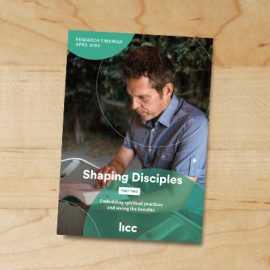Why spiritual practices are the rocket fuel you need to live more like Jesus
Do you want to grow as a disciple of Jesus? Do you want that growth to impact every area of your life – not just who you are on Sunday morning, but how you wo...
Read

In 2022, we recruited 82 Christians of different ages from around the UK to take part in a 12-week research project. It was the second instalment of Shaping Disciples, a project exploring the impact spiritual practices have on the way Christians live out their faith.
A spiritual practice is an intentional habit designed to help disciples deepen their faith, shape their character, and integrate faith into daily life – like Bible reflection, the prayer of Examen, and breath prayers.
We taught our participants four practices to see how they got on with embedding them in their lives, and what difference it made to their everyday discipleship. You can read the full report and check out a quick summary of the key findings – but in essence, we discovered that embedding spiritual practices into daily life helps people live more like Jesus (funny, that!).
If you’re a church leader of any variety, this article will give you some ideas for how to help people in your congregation engage with spiritual practices in their daily lives.
Anita’s panicking. It’s 07:25. She’s still got to pack the kids’ lunches, find a missing schoolbook, do Olivia’s plait (because Olivia has insisted on a plait today), make sure… hang on, Eva’s just knocked over Olivia’s bowl of Cheerios. Ah yes, there’s that book – dripping with milk. A mere 25 minutes before everyone MUST be in the car. Once Operation School-Drop is accomplished, Anita will have the luxury of a full day writing marketing copy for a pet food company. Bliss!
Imagine Anita is part of your church. You like Anita; she’s warm, insightful, proactive. She wants to follow Christ as she parents, and works, and goes to book club. You want this for her, too! You know some spiritual practices would help her grow.
But how can you help Anita embed some practices into the rhythm of her (very busy) day? How can you help others in the congregation do the same? Here are four ideas drawn from our research that you can try.
Extinguish guilt
Before we start the process of encouraging people in their use of spiritual practices, there’s something we need to be aware of. In the research, we found that when you talk to people about spiritual practices, it doesn’t take long for words like ‘guilt’, ‘should’, or ‘failure’ to surface. You don’t need to be a psychologist to recognise these feelings might not lead to healthy and lasting change!
It’s important we don’t inadvertently feed the guilt monster that can dominate people’s hearts! As disciple-makers, we want guilt to vanish in the presence of grace, and in the absence of guilt, for hope to emerge.
Spiritual practices really do make a difference. But as we encourage people to engage with them, it’s vital we use the language of ‘can’ and ‘invited’, rather than ‘must’ and ‘should’. We are not saved by practices, nor are we saved for practices. Practices are not the goal; they are a means by which we grow into the people God is calling us to be. You can’t emphasise that enough!
Encourage experimentation
One of the things we’re so glad we did at the beginning of the research journey, was to encourage participants to see the 12 week-process as a time to experiment. The great thing about experimentation is failure is baked-in to the process. It’s expected. Failure isn’t even seen as failure – it’s reframed as a learning opportunity.
By trying stuff out, you learn what works and what doesn’t. Participants could experiment with when they did practices, and how they did practices. We encouraged them to be flexible and creative – to make the practices work for them and the lives they have.
Those who fared best were those who embraced this mindset. They didn’t beat themselves up if something didn’t work out. And if a practice wasn’t working for them, they played around with it until it did.
In reflecting on the whole process, one participant thanked us for ‘the permission that you’ve given in saying “try this, and if it doesn’t work, don’t worry”. It’s been very flexible and accommodating. It’s come across in a really lovely way, which has meant that it’s easy to engage.’
So, as you start working with people in your church, invite them to don their experimenters’ hats.
Teach integration
Whatever kind of life people lead – no matter how busy – there are always opportunities to integrate practices into the day. Anita (the busy working mum we met a moment ago), found that even though her morning routine is insanely busy, she was able to read a few verses of Scripture while hiding in the bathroom, and then to reflect on those verses in the shower.
Throughout the day, Anita fires off a number of emails. She’d noticed that sometimes she could be a bit blunt in the way she communicated with others. So, she put a post-it note on her laptop with the proverb ‘A gentle answer quietens anger, but a harsh one stirs it up.’ This helped her be more mindful of the person to whom she was writing, and to think about the response her language would bring about.
Even the moments when she found herself getting stressed or frustrated acted as a useful prompt to connect with God. She used those feelings as a cue to pray a short breath prayer, releasing the tension and inviting God’s peace.
Draw alongside
Forming new habits is a fragile process. It takes a lot of effort to overcome the inertia, and little effort to give up on a habit that’s still forming. In the research process, one of the things that helped people get going and keep going was the presence of others. The sense of being on a journey with other people, and knowing the LICC team would contact them along the way, provided a combination of encouragement and accountability.
And when people got stuck, having a conversation with one of us made a huge difference. In fact, several weeks into the process, I had a conversation with Anita about her practices. She mentioned the post-it plan described above. In the training session a couple of weeks before, Anita had written the note, but for whatever reason still hadn’t stuck it on her laptop. In the middle of our phone call, she went, got the note, and stuck it on there. The mere presence of someone asking her about it changed her behaviour.
In your efforts to help your congregation get and keep going with practices, encourage people to journey together, and make sure there’s at least one person who will provide some kind of accountability and support for moments when they get stuck.
‘Knowing that I’ll be asked about the practices by email or interview from you, being part of a research process, has been really helpful in doing the practices. And that’s really challenged me to think about why we don’t do that in wider church life, in our small groups, with friends. It can feel awkward or too personal, but it’s important.’
Now what?
If you’d like to know more about the research we did, the way we taught the practices, how people built them into their everyday lives, and the impact they had on discipleship outcomes – check out the full report here.
Otherwise, start making a plan for how you can get your church fired up and wired up for a lifetime of great spiritual habits. And through that, see how God brings about sustained growth, joy, and fruitfulness amongst his people.
—
Joe Warton
Researcher, writer, and coach
